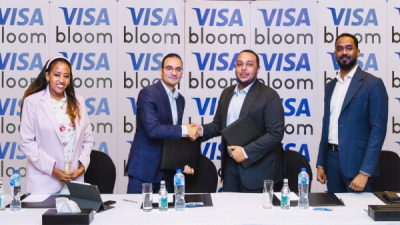
Solutions (581)
In recent years, delivery services have popped up in major cities across Africa. They take last-mile delivery to another level, allowing their users to order almost everything and get them delivered to their doorsteps. Nigerian entrepreneurs have decided to do the same by delivering food to busy individuals.
Heyfood is a digital solution developed by an eponymous Nigerian start-up. It allows users to order foods from multiple restaurants.
The solution has a mobile app accessible on Android and iOS. On registration, users can browse the available restaurants, order the foods they want and get them delivered as quickly as possible.
Restaurants can also register on the platform to reach a broader client base. Using integrated features, they can manage and process orders and seamlessly receive payments. It also allows individuals to earn extra income by delivering orders.
Let’s note that Heyfood, an Ibadan-based startup founded in 2021, collects US$1 per order delivered. Its Android app has been downloaded more than 10,000 times. Currently, it is rated 3.9 out of 5 on Playstore. In 2022, the startup was selected to participate in the winter cohort of Californian accelerator Y Combinator.
Adoni Conrad Quenum
Tech innovations are gradually taking over every sector with solutions addressing existing challenges. In Nigeria, Boomkit is doing the same in the show business.
Boomkit is a digital platform developed by an eponymous Nigerian musictech founded by Abiola Hamzat and Ridwan Jimoh in 2021. It allows independent artists to distribute their music to a wider audience and build an extended fan base.
Thanks to its mobile app - available for Android and iOS devices, Boomkit makes it easy for artists to collect earnings through local bank accounts.
"Royalty collection has always been an issue for African artists, and most African artists end up forfeiting their earnings from music sales. Popular American distribution companies like Tunecore and cdbaby will require an artist to provide a PayPal account before they can process earnings, but unfortunately, PayPal is unavailable in most African countries," Hamzat said.
Artists can also receive funding from their fans through SupportME, a built-in feature. “This creates a new source of revenue for independent artists. With royalty advance, the credit is secured against their projected earnings from music sales,” Hamzat explains.
Boomkit also helps distribute music on all other digital platforms such as Apple Music, Spotify, TIDAL, Boomplay, Audiomack, and over 150 digital stores. The platform has more than 10,000 users and more than 3,000 songs have already been released. It offers independent artists packages ranging from $0 to $20. Although Boomkit is not yet officially present in Ghana, South Africa, Kenya, Tanzania, and Rwanda, artists from those countries can use the app to promote their songs. According to Boomkit co-founder Abiola Hamzat, the startup will officially enter Ghana and South Africa soon.
Adoni Conrad Quenum
The fintech, which developed the solution wants to help Sudanese users manage the growing devaluation of their local currency. Its ambition is to expand in East Africa, a market of about 500 million individuals.
Bloom is a fintech solution developed by a Kenyan eponymous startup. It helps users save in US dollars and spend Sudanese pounds. The started behind the innovation was founded in 2021 by Ahmed Ismail, Youcef Oudjidane, Khalid Keenan, and Abdigani Diriye. In July 2022, it completed a US$6.5 million funding round to support its growth.
According to Ahmed Ismail, “the plan is to scale in the country and then expand to other markets. We anticipate being in at least one market before the end of the year and a couple more early next year.” Bloom’s ambition is to help Sudanese manage the rapid devaluation of the Sudanese pound.
The fintech has a mobile app, which can be downloaded from AppStore, PlayStore, or its web platform. Users can create free accounts by registering with their phone numbers to start saving. "Banking services are provided by the Export Development Bank, which is licensed by the Central Bank of Sudan and is a member of the Bank Deposit Security Fund of the Central Bank of Sudan," the fintech indicates.
Bloom claims more than 100,000 users. It has strategic partnerships with the likes of Visa, which invested in its funding round for regional expansion. In March 2022, the fintech was selected to participate in the Winter 2022 cohort of the Californian accelerator Y Combinator.
Adoni Conrad Quenum
With the coronavirus demonstrating the importance of distance learning, many companies have set out to conquer the market by deploying significant resources to face the competition from international platforms.
eCampus is an e-learning platform developed by a Ghanaian eponymous startup. It is the modern platform of the startup, which started digitizing courses in 2003 by uploading them on floppy diskettes to allow users to conveniently learn without having to face the rigid traditional education means.
The e-learning platform helps users (students and employees notably) reach their training goals via its web and mobile apps launched in 2015. According to eCampus founder Cecil Senna Nutakor, the whole thing started following its harsh education experience. “I failed my final secondary school exams three times in a row, and all those times I wanted to find a tool I could use to prepare me and let me know if I was ready for the exams. I did not want to believe I was dumb as my parents and uncles thought, because I knew there was just a problem with the system,” he indicates.
eCampus’s mobile is accessible for Android and iOS devices. It allows users access to the resources available on the platform, provided they create an account by providing an email, a password, names and surnames, and referrers (if any).
The solution uses artificial intelligence to optimize students’ revision process by letting them know their strengths and weaknesses. It uses the same technology to help employees assess their preparedness for the job market and the relevance of their skills.
The e-learning platform also allows teachers to earn additional income by helping students and employees. With the coronavirus demonstrating the importance of e-learning, the startup now claims more than 50,000 registered users, including over 25,000 active users and more than 1,719 lessons available. It plans to expand into English-speaking East and Southern African markets and into French-speaking Africa.
Adoni Conrad Quenum
The private health sector is growing rapidly in Africa. However, the sector is still much disorganized, prompting some entrepreneurs to introduce solutions to save as many lives as possible.
Medsaf is a digital platform developed by a Nigerian eponymous start-up based in Nigeria and the United States. It aims to make the pharmaceutical products’ supply chain more efficient by connecting hospitals and pharmacies with drug suppliers. The startup was founded in 2017 by Joao Pinheiro, Temitope Awosika and Vivian Nwakah after one of its co-founders (Vivan Nwakah) lost a friend due to counterfeit drug.
"The lack of proper supply chain infrastructure drives health care stakeholders to the open drug markets to find their medications and consumables.
The gap in the market was due to the absence of an entity properly adressing [...]Issues around how all players in the supply chain interact with each other and the reasons there are severe lapses within the pharmaceutical supply chain. [...] I realized early on that there needed to be a platform to reduce the friction between stakeholders and influence and reward positive behaviors in a sustainable way," Vivian Nwakah explains.
Medsaf is now that platform, a bridge that facilitates the introduction of quality medicines in Nigeria. By 2020, more than 160 hospitals and pharmacies have shopped on Medsaf. The start-up helps acquire everything from diagnostic products to reagents, equipment, and consumables. As such, it acts as a "one-stop-shop for hospitals, clinics, and diagnostic centers to purchase, manage, and track their crucial medication needs with technology."
Apart from being a marketplace, Medsaf also offers a range of services including Medsaf Assure, which allows subscribers to purchase products at discounted prices. The startup also plans to roll out Medsaf Speedy and Medsaf Patients direct services. Its plan for Medsaf Patients Direct is to work with a network of doctors to supply their patients with medication for certain chronic diseases. As for Medsaf Speedy, it is intended to be an express delivery service, delivering orders the same day when buyers are in Lagos and within 48 to 72 hours when outside the Nigerian metropolis.
Overall, Medasf plans to expand to West and East Africa in the coming years.
Adoni Conrad Quenum
A few years ago, the African social media landscape was dominated by foreign messaging solutions. However, nowadays, local entrepreneurs are stepping in with local apps that integrate a set of useful features.
Dikalo is a digital platform developed by an eponymous Cameroonian startup founded in 2016. It allows users to discuss without sharing personal information.
It is available as an Android app, which incorporates features (like file sharing, voice, text, video messaging, etc) common to most instant messaging apps. It also includes packs of stickers dedicated to each African country. For instance, there is the “naija” sticker pack for Nigeria or the “zouzoukwa” pack for Côte d’Ivoire.
To register on Dikalo, users need to create a nickname, provide an email and create a password. The app then generates an authentication code to validate the registration. Dikalo does this to protect its users’ personal data in line with its transparent personal data management policy.
Currently, Dikalo, which plans to integrate a mobile money solution into its platform, claims more than 100,000 registered users, including 87,000 active users. "Most of our users come from Cameroon and Côte d’Ivoire. Our main goal is to become the most used social media app everywhere. My ambition is to grow in countries like South Africa, Kenya, Ghana, Nigeria, Rwanda, Algeria ...," says Dikalo founder Alain Ekambi.
Adoni Conrad Quenum
E-commerce has gained momentum in Africa since the Covid-19 period. Numerous platforms have emerged to help the population buy what they need online and allow sellers to sell more. With Kwely, the focus is now on selling more local products abroad.
Kwely is a B2B platform developed by an eponymous startup based in Senegal and the USA. The startup behind the platform was founded in 2019, by Birame N. Sock (photo). It aims to become the Alibaba of products made in Africa. For that purpose, it raised US$1.7 million to carry out its targeted projects.
According to Birame N. Sock, Kwely is a bridge between African producers, global consumers, and international buyers. “The goal is to be Africa's leading B2B e-commerce platform, redefining how African products are perceived and how African buyers and sellers transact with each other and the rest of the world,” she explains.
The best way to become one of Kwely’s suppliers is to enter its incubator program Tekki, which is currently in its second cohort. The program teaches producers how to improve packaging to meet international standards and gives tips to develop a scalable and adequate international business or marketing strategy as well as create effective product storytelling to enter the targeted markets.
Tekki helps producers create an export-ready brand while the Kwely platform offers marketing and distribution services. The products available on the platform include cosmetics, food, and home accessories.
Adoni Conrad Quenum
Recently, the e-commerce boom gave a new impetus to a concept that started in the 1970s: dropshipping. Although the popularity of that concept is growing among Africans, there is almost no local platform facilitating the process. Tendo is changing that.
Tendo is a digital platform developed by a Ghanaian eponymous startup, connecting local suppliers with dropshippers. Before Tendo, “people who want to sell online [had] to save money, visit hundreds of suppliers to find a trusted one, and risk losing their capital by stocking up inventory. [They also had] to incur costs for logistics and warehousing,” explained co-founder Felix Manford. With the creation of the startup Tendo (in 2020), all that changed, he added.
The solution addresses additional challenges, allowing any individual who so wishes to become a retailer. "Tendo enables anyone to start their online business without investing any capital," the platform indicates. All the retailers have to do is share the goods listed by suppliers with potential customers. When a buyer places an order with the retailer, the latter simply sends the order and buyer’s details and lets the supplier deliver the order. Once the order is delivered, the retailer will receive the profit he/she generated.
Tendo also has a mobile app (accessible for Android and iOS devices) that allows users to perform all the tasks they can carry out on the web platform. It also allows suppliers to register on Tendo and leverage the retailer network to quickly sell their goods.
From 2020 to date, the Ghanaian startup behind the platform has raised over US$220,000. This year, it expanded into the Nigerian market and got selected to participate in Y Combinator’s winter cohort.
Adoni Conrad Quenum
The solution was developed to help SMEs save resources and time by outsourcing some of their management chores.
Workpay is a digital solution developed by an eponymous Kenyan startup. It allows African SMEs to hire, manage and pay their employees. The startup, which developed the platform, was founded in 2019 by Jackson Kibigo and Paul Kimani. From its inception to date, it raised over US$2.4 million to support its African growth
According to co-founder Paul Kimani, the funds raised have provided an opportunity for Workpay to scale its “human resource management and payroll processing tools to SMBs and expand to enterprise clients across East Africa.”
“We are fortunate to have the backing of some incredible people on our mission to make it easy for businesses to manage and pay employees across Africa,” he added.
The digital solution has a mobile app, accessible for Android and iOS devices. The mobile app allows users access to the various web services offered by Workpay and also allows them to monitor team performance in real-time and hire the best African talents.
To let subscribing companies enjoy their subscription to the fullest, Workpay’s pricing is dynamic and tailored according to every company's need. “We believe not all companies are the same. Therefore, our packages and pricing are different for each company,” the Kenyan startup indicates. On its website, it claims over 500 firms are using its solution, including Nigerian unicorn Flutterwave.
Adoni Conrad Quenum
The solution started in 2018 as an Instagram page offering educational assistance. It evolved to become the edtech platform, as it is known now, to allow students to help their peers in a quick and more conducive manner.
Stranerd is an edtech solution developed by a Nigerian startup Stranerd LLC, founded in 2021. It allows students to help themselves in various subjects by asking or answering course-related questions, with rewards for the best students who are most active on the platform.
"Our goal is to build the largest community of students where collaboration and innovation thrive, to create opportunities for the student to function at the highest level possible and bring the most value to the student community. We intend to do this by fostering peer-to-peer learning by giving students the tools to collaborate and solve their problems," said Stranerd LLC co-founder Jeremiah Godwin.
The solution is available as an Android-only mobile app. It helps students prepare for exams using flashcards and course notes and questions.
Through its gamified, sleek, and ergonomic interface, Stranerd encourages students to spend enough time on the app to better grasp course subjects. Peer-to-peer learning, as the startup calls it, is free on the platform. However, it is subject to registration (with a set of personal information). For those who wish for it, the startup also offers paid tutoring services and assignment assistance online.
In 2022, the startup, which started as an Instagram page offering educational assistance, was selected among the 45 participants that will take part in the second edition of the accelerator program Future of Work Africa.
Adoni Conrad Quenum
More...
There have always been debates about the efficiency of mainstream teaching methods in Africa. Some claim that the methods are not efficient since they are tailored to local realities. In Tunisia, a startup is addressing that issue to improve the performance of primary school pupils in a fun way.
Class Quiz is a digital solution developed by the Tunisian start-up Envast, founded in 2016 to make quality education accessible to everyone. The digital solution helps primary school pupils learn while playing.
It has a mobile application, available on Play Store and Huawei App gallery. Its contents are adapted to the requirements of the Tunisian national curriculum and presented in a fun manner to attract children. Class Quiz can be used to revise school concepts or even learn at home under parents' supervision.
To allow access to the quiz contents, Envast charges forty Tunisian dollars (about US12.5) for a 3-month subscription. Envast indicates that its primary target is the African education market, which is expected to grow to US$1.8 billion by 2024. In addition to its services to individuals, it creates content for non-governmental organizations and foundations. For example, it created content for Orange Foundation’s Digital School. It also created content for the French Institute’s "Yallab" project. In 2021, thanks to Class Quiz, the startup was one of the finalists of the accelerator program Emerging Mediterranean.
Adoni Conrad Quenum
According to the United Nations, the infant mortality rate in Mali was 91 deaths per 1000 births, much higher than the Sub-Saharan African average (73). Denko could complement authorities' efforts to reduce that rate.
Denko Kunafoni is an eHealth solution developed by Malain startup OSI Tech. It allows pregnant women to monitor their health status during pregnancy and receive health tips. It also helps the women keep a tab on numerous doctor appointments and book one if necessary.
The eHealth solution has a mobile app (currently available for Android devices only) available on Google Playstore. Through the app, pregnant women can learn everything they need to know about pregnancy and maternity. They can also anonymously ask questions and receive answers from medical specialists, as well as receive daily tips to improve their lifestyle. In addition, Denko gives mothers developmental milestones to efficiently monitor their children’s development up to three years of age.
To access all those services, mothers and mothers-to-be have to register by providing a set of information for personalized assistance during and after pregnancy. With its feature allowing communication in local languages, Denko is accessible to everyone, even the illiterates. In 2019, the solution won Orange Mali’s social entrepreneurship competition.
Adoni Conrad Quenum
Digital trust is an important component to boost the adoption of digital services. In Morocco, where digital transformation is ongoing for years now, a legal framework was approved governing digital trust in the country. It paved the way for startups like DamaneSign to enhance trust in the digital sector.
DamaneSign is a Moroccan digital trust solution. It helps users digitize their signatures and authenticate them. The solution was developed by a startup, founded in 2021, months after a national law on digital trust. So, it was highly welcomed in the local tech ecosystem.
“The product is a SaaS (online) solution that allows you to sign and have documents signed securely. We act as the trusted third party between companies and their customers, allowing them to sign different contractual documents. We also help manage transactions with multiple signatories or sign multiple documents,” explains Zouhair Hamdaoui, founder of the startup that developed DamaneSign.
When required, the startup sends emails to every signatory inviting them to sign required documents as needed. Those signatories also receive authentification codes via SMS. “An agent readies the documents (contract, quote, invoice...) for electronic signature on the DamaneSign platform. The signatories receive those documents in their e-mail, read them, and sign,” Zouhair adds.
The startup offers two subscription packs to its users. The first pack costs MAD 300, allowing the user to send 25 documents to signatories for signature. The second pack costs MAD3,999 allowing, the subscriber to send up to 500 documents for signature.
Let’s note that DamaneSign stores users’ data in a data center located in Morocco. To sign documents, signatories must also have an account with DamaneSign or register one. For companies, the required information is the name of the entity, the number of the company, the professional information of the person registering the account on behalf of the company, and his/her professional email.
Adoni Conrad Quenum
Retail business is the most popular activity in Africa. However, the daily management of the transactions carried out by such shops can prove difficult for owners. Weebi, a Senegalese startup wants to ward off those difficulties.
Weebi is a fintech solution launched in 2015, by an eponymous Senegalese startup. It is a multilingual tool that allows users (retail businesses mostly) to manage sales, supplies, payables, and receivables.
The solution was launched because “we noticed that merchants needed tools to efficiently and transparently manage their cash register,” indicates Cheikh Sene, one of Weebi's co-founders.
“Weebi streamlines commercial exchanges. It helps manage the cash register and clients’ transactions securely and fairly. Weebi ends disputes involving clients’ transaction history,” added Kande Diaby, another co-founder.
The solution is delivered to users as a kit composed of a tablet computer and a printer. Using the dedicated tablet, Weebi’s paid users can create separate sheets for each of their clients. On the sheets, clients’ purchases can be listed and the type of transaction (paid in cash or on credit).
Weebi also allows its users’ clients to load dedicated wallets that can be debited for each transaction made. In case of problems, the startup’s team is usually available to go on the ground to assist merchants. For paying users, its subscription ranges from XOF99,900 and XOF149,000 for a computer tablet, an anti-theft device, a printer, and the bookkeeping app.
The solution has won several awards since its launch. These include the Digital Innovation Award in January 2017 (Tigo / Reach for Change), the Digital Africa Challenge in 2017 (French Development Agency / BPIFrance), and the Arbre à Palabre hackathon in December 2017 in Abidjan (Société Générale). In the coming years, its developers intend to deploy it in Burkina Faso, Guinea, Gabon, Angola, and Ethiopia.
Adoni Conrad Quenum














